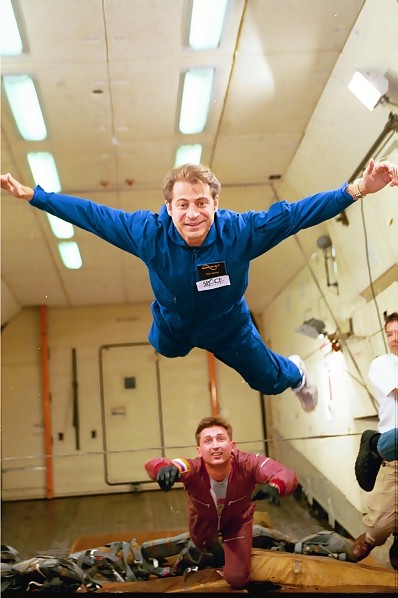Peter Diamandis: Key to Lunar Frontier in Private Hands

Breaking space news, the latest updates on rocket launches, skywatching events and more!
You are now subscribed
Your newsletter sign-up was successful
Want to add more newsletters?

Delivered daily
Daily Newsletter
Breaking space news, the latest updates on rocket launches, skywatching events and more!

Once a month
Watch This Space
Sign up to our monthly entertainment newsletter to keep up with all our coverage of the latest sci-fi and space movies, tv shows, games and books.

Once a week
Night Sky This Week
Discover this week's must-see night sky events, moon phases, and stunning astrophotos. Sign up for our skywatching newsletter and explore the universe with us!

Twice a month
Strange New Words
Space.com's Sci-Fi Reader's Club. Read a sci-fi short story every month and join a virtual community of fellow science fiction fans!
Forty years after the first manned moon landing on July 20, 1969, SPACE.com asked Apollo astronauts and leaders of the space community to ponder the past, present and future. X Prize founder Peter Diamandis discusses the disconnect between the promise of Apollo and today's reality, and looks ahead to the future of private lunar exploration with the Google Lunar X Prize:
SPACE.COM: Do you remember the Apollo 11 landing?
Peter Diamandis: I remember the Apollo program, but I think it was Apollo 13 that really galvanized my interest, and sort of the drama and the ultimate victory of human ingenuity. But the Apollo program ultimately shaped my life and everything I've done. It was the most important formative activity of my life in that it made me aware of the ability for humanity to do literally unimaginable feats.
And the difficulty is that for a child, it sort of created expectations that were extraordinary that have never been matched again.
I think that many successful space entrepreneurs - and I include myself and many of my colleagues in the private spaceflight industry and many of the wealthy space benefactors - all got their start in Apollo. There's been a disconnect between the future that was thought possible after the success of Apollo and where we are today. It's been a massive letdown. And so those who've got the technical, intellectual or financial means to try and do it privately are now attempting to fulfill the promise that Apollo made 40 years ago.
S: So when you watched the Apollo missions, did you think we'd be going to Mars or living on the moon soon?
D: Well, of course. You've got to ask yourself the question: Forty years after Apollo, when you've got computers that are tens of billions of times faster and millions of times cheaper, what's wrong with this picture?
Breaking space news, the latest updates on rocket launches, skywatching events and more!
S: When did you first start to think we'd gone off track?
D: In the mid-80s, when all the promises made by the shuttle program turned out to be false, and where the ability for NASA to actually set and implement audacious plans failed over and over again.
S: What is your opinion on why those expectations weren't met?
D: A very clear reason: In the 1960's, Congress was a much simpler organization where people could set 10-year goals and get long-term support for them. Today, programs are continually re-evaluated every year or two, and government space programs can't be done that way. Government space programs can't be done on one-year budgets, they need decade-long commitments, which we don't currently have.
S: Is that experience what led you into the private spaceflight arena?
D: Yeah. My mission in life is to open up the space frontier, and I at one point gave up on governments being the mechanism to accomplish that. And so in looking at it, what seemed what was necessary was going to be an economic engine. As I looked at other industries that were similar, that required huge capital expenditures - whether it was the railroads or the oil industry - there needed to be a business model that made sense.
S: So do you think that it is private ventures and contests that are going to get us back to the moon and beyond?
D: Ultimately, in order to change the equation - I mean spaceflight has gotten more expensive, not less expensive over the last 40 years - and ultimately the reason for that is that the majority of the cost of spaceflight is labor. It's not fuel, it's not physical materials, spaceflight is 90-plus percent labor costs. And the cost of labor has gone up. And the fact of the matter is that the contracting and legal costs have gone up. And these things have driven up the cost of spaceflight.
So the question really is, how do you drive breakthroughs? And breakthroughs are only going to happen when there are really novel and inherently risky approaches taken. And that can only be taken by private companies - government agencies and large aerospace contractors will not take those risks.
S: So what do you think of NASA's newest efforts to go back to the moon?
D: I don't know. It's wait-and-see. Traditionally what happens is that NASA sets out a goal, and then it's paused - as it has been just recently with the newest commission - and NASA has a history of start-stop, start-stop, cancel programs."
Every time something happens, everything is re-evaluated, and all the money that's been put in is basically washed. We've done this; we've been to this movie a dozen times over the last 30 years.
And now it would not surprise me if NASA did not start focusing on the environment and people saying, 'well we have economic crisis and we have environmental crisis, why is NASA going to the moon and Mars again when we have plenty of problems here on Earth?'
That's where the importance of private industry can and should play [a role], where wealthy benefactors and private companies are not subject to the whim of Congress.
Q: So do you think that should be the model: private industry handles the riskier ventures and NASA focuses on the problems people are really worried about here on Earth?
D: It's obviously going to be a mix of both. The ideal circumstance is that NASA is doing the riskiest - government should be taking on the riskiest work and the riskiest business. Private companies should be building businesses.
Southwest and American Airlines fly people back and forth between D.C. and Houston. Dell and Apple Computers build NASA's computers. NASA doesn't fly their own airplanes, or it doesn't build its own computers. In the same way, the fact of the matter is private industry should be providing the transportation. NASA should be saying 'we'll pay $20 million per seat to orbit, and we will buy 200 seats a year.' Now private industry can respond to that.
S: So whether that will happen is up in the air right now?
D: Well, what's interesting is today there are a thousand billionaires on the planet. And some of these individuals will have the financial wherewithal to build and ultimately implement their own private launch vehicles and private space programs.
Human exploration is something that's been going on for thousands of years, and the models that worked 500 years ago are likely to work again today.
S: How long do you think it will realistically be until we're back at the moon? Or get to Mars?
D: I think that the Google Lunar X prize could take companies privately to the moon, telerobotically in the next four years. I think there's a high likelihood that a private team will beat a government agency back to the surface of the moon. And I think I would not be surprised if in the next 10-plus years that a private company or a private individual says 'you know, I'm ready to commit a few billion dollars to try it do it privately and take the level of risk that might actually try something new.
S: Do you think public interest is important in driving these ventures, even if they are private efforts?
D: I think the public interest is critical to all of this. That's the difficult problem that NASA, while it serves the public, does not aggressively make spaceflight of interest to the public. When a beautiful launch is called 'nominal' instead of 'phenomenal' it's - traditionally it's been bad to market or promote, which is terrible. Because how do you make it exciting and interesting if you can't package it that way? So there's two strikes against NASA when it can't do that.
S: Do you think any of the lack of interest has to do with the difference between today and the '60s?
D: Sure. The 'been there, done that' mentality is part of it. Part of it is that, how does the public actually get involved. 'So some person's going [to space], but how does that relate to me?' The thing which NASA should be doing is sending public icons into space, sending some of the people that individuals relate to. Because right now, the public does not relate to our astronaut corps, nor is it the astronauts' jobs to be public icons. But if part of what NASA's mission is, and I do believe it is, is to excite kids about science and engineering, math, technology, then kids have to be able to relate to and be excited about the programs that NASA is implementing. And people relate to people - it is fundamental. And it's basic human psychology which is not getting utilized to get the public excited about the space program.
S: Do you think the private spaceflight industry can fill that marketing niche?
D: So, private industry's job is to make money. Private industry's job is to create a huge economic engine. So, from the standpoint of private industry, I think - I'll give you a personal example: So, back two years ago, Zero G flew Stephen Hawking, which everybody advised us against: 'It's too risky. You're going to kill the guy. He shouldn't be doing this.' We actually had to change the rules, the FAA rules, regulations to allow us to do it. But of course, that's exactly the right thing for us to have done.
So the difficulty is that NASA has become, as an organization, very risk-adverse. So consequently, the only way to get rid of risk is to do less risky things, and to throw a lot of people watching people watching people and that drives the cost up.
Industry's best job will be to create the first huge amounts of wealth derived from space. The communications industry has been tremendously successful, but we need to build the railroads and the oil wells and the gold mines of space.
S: How important will space tourism be to this whole marketing idea?
D: Well, to me, I think it is extraordinarily important, and that's why the companies I have started have been about making space a first-hand experience. And it's a very important technology. Right now space is a third-hand [experience] - someone can see it on TV, or they know someone who knows someone who's an astronaut, but kids have no interest in something that they can't do, that they can't participate in. And the fact that you can go and fly in Zero G, or the fact that you can go and plan or desire to fly into space and know that you can - so people can believe that, not only in my lifetime, but in a reasonable amount of time, within the next five or 10 years, I have a good shot at going into space, then they have a reason to care about it.
Forty years after astronauts first set foot on the moon, SPACE.com examines what we've done since and whether America has the right stuff to get back to the moon by 2020 and reach beyond. For exclusive interviews and analysis, visit SPACE.com daily through July 20, the anniversary of the historic landing.

Andrea Thompson is an associate editor at Scientific American, where she covers sustainability, energy and the environment. Prior to that, she was a senior writer covering climate science at Climate Central and a reporter and editor at Live Science, where she primarily covered Earth science and the environment. She holds a graduate degree in science health and environmental reporting from New York University, as well as a bachelor of science and and masters of science in atmospheric chemistry from the Georgia Institute of Technology.
